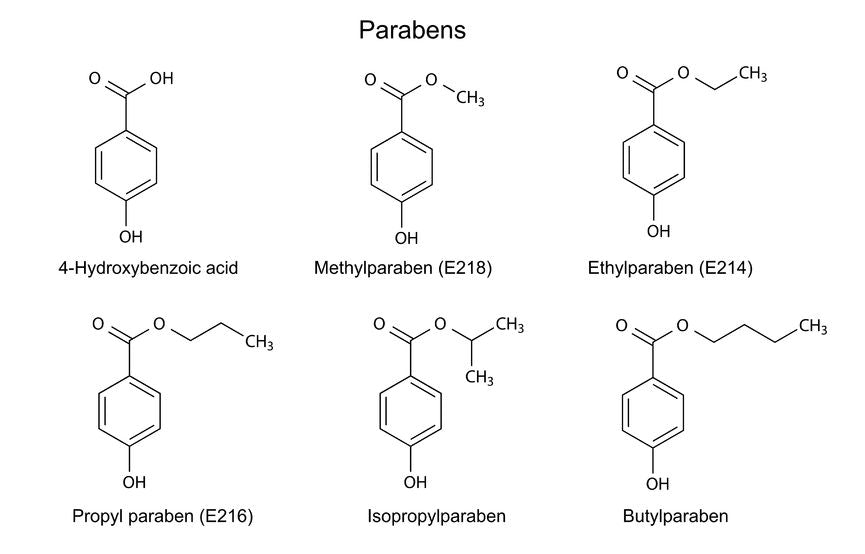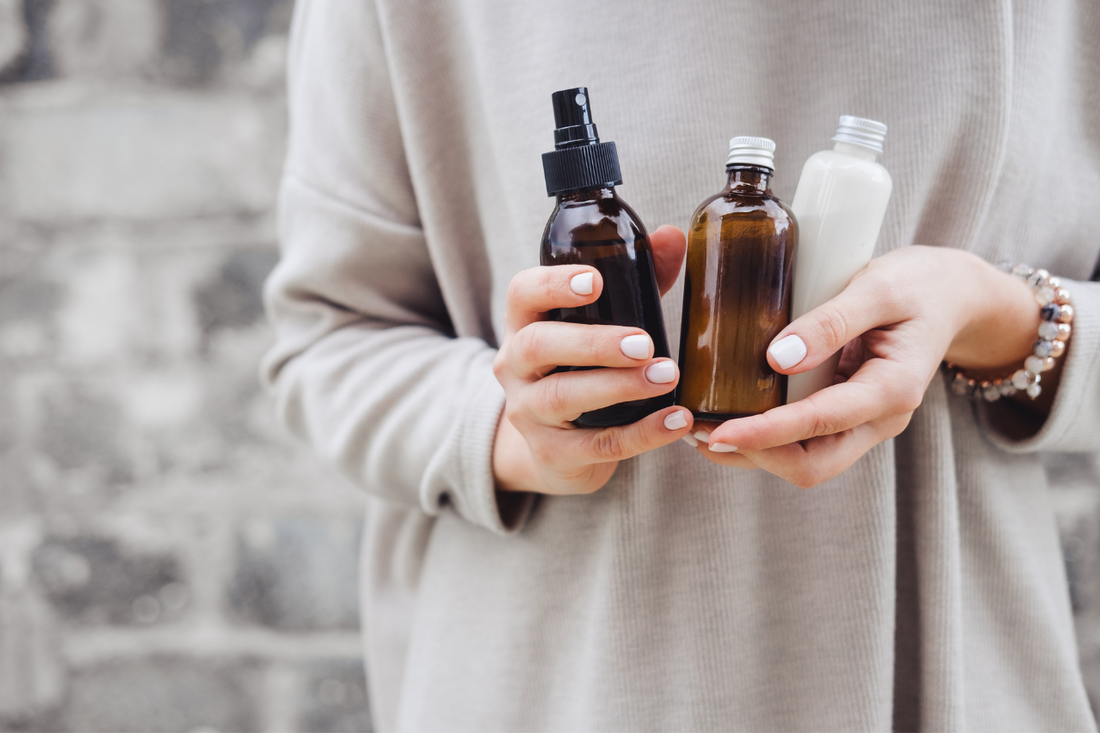Blog
Are Parabens Bad in Cosmetics?
When it comes to cosmetics are parabens bad? Widely used as preservatives since the 1950s, parabens are available in a range of forms including butylparaben, ethylparaben, isobutylparaben, methylparaben, or propylparaben. They are added to health, beauty and personal care products to keep them free from fungus, mold, bacteria and other dangerous microbes. They are also used in baked and processed foods. While the use of preservatives in skin care is non-negotiable when it comes to maintaining the safety and integrity of your cosmetics, there are many choose from. In this article, let’s look at parabens in a bit more detail. The Paraben Controversy In a 2004 study, trace amounts of parabens were found in breast cancer samples. While the study didn’t prove that they can cause breast cancer, it did confirm that parabens were able to enter the skin and remain within tissue. A more recent study found higher levels of one paraben, n-propylparaben, in an area of the breast where the highest proportion of breast tumors is found. Because they’re known to have weak estrogen-like properties, there is concern for their potential as endocrine disruptors, which means that they are capable of disturbing the normal function of the hormone system. Since our hormones control many of functions of our body, a disruption to this can impact several things including growth, development, reproduction and brain function. Parabens are known to mimic the growth effects of estrogens on breast cancer cells, yet some consider their effect too weak to cause harm. However, a 2015 study looked deeper by examining breast cancer cells and exposing some to parabens. Researchers found that they not only triggered the estrogen receptors by turning on genes that caused the cells to grow, but did it in quite a significant manner and at very small concentrations. The study demonstrated that parabens may be more potent at lower doses than previous studies have suggested, which may spur scientists and regulators to rethink the potential impacts of them on the development of breast cancer. What Should One Do – Are Parabens Bad? The concentration of parabens used in personal care products tends be less than 1% and both the Food and Drug Adminstration (FDA) and the American Cancer Society maintain that studies haven’t shown any direct link between parabens and health problems — including breast cancer. There are also no concerns or restrictions regarding their use in Canada or Australia. In the EU, regulators have signed off on the safety of some parabens, but increased restrictions on their use and completely banned them in some instances. They have also reduced the maximum concentrations allowed for propyl- and butylparaben. Contrary to many rumours, the use of parabens has not been banned in the EU. So, are parabens bad? Maybe, maybe not. What is clear is that more research is necessary. If you wish to avoid them, it’s important that you get used to reading product labels. Avoid those listing anything ending in -paraben – ethylparaben, butylparaben, methylparaben, propylparaben, etc. Also keep in mind that just because a company says that their products are ‘paraben free’, it doesn’t mean it’s safer as it could be hiding a host of other potentially bad-for-you ingredients, including not having an adequate preservation system. Products that are anhydrous can be safely formulated without preservatives but anything containing water must contain one. For those of you who ask the question, “are parabens bad?”, the answer isn’t clear. However, at Apothekari we have taken the precaution of formulating without them because why risk it when safer options are available.
Learn morePreservatives in Skin Care – 5 Things To Know
The use of preservatives in skin care can be a confusing topic. On the one hand, you’ll hear about how preservatives are associated with side effects. Yet, other companies and scientifically minded individuals (like me) express concern over the safety of cosmetics promoted as being ‘preservative free’. It’s getting confusing out there! In this post, let’s take a closer look at preservatives in skin care to help you understand why preservatives are important and how to choose products that are as safe as can be. Here are five things that will help you navigate the cosmetics counter without a science degree. 5 Tips to Navigate the Cosmetics Counter 1. If A Product Contains Water, It MUST Have a Preservative Many cosmetics contain water and when water is present, it contributes to the growth of mold, bacteria and fungi. Even if the formulation doesn’t contain water, cosmetics are often kept in humid environments and may be contaminated when your hands touch the contents. Preservatives help to prevent the growth of these dangerous substances. 2. Not All Chemical Preservatives Are Bad While chemical preservatives may be problematic in high doses, the quantities used in cosmetics are minimal, generally less than 1%. The main concern is with preservatives that cross over into the blood stream where they may lead to side effects. The following are ones we should watch out for: Phenolic acid (Phenol). In large quantities, it has been known to cause respiratory issues, coma, fainting, and even paralysis. Phthalates: Phthalates can be absorbed through the skin and accumulated in the body. They are associated with the development of breast cancer, asthma, ADHD, obesity and Type 2 diabetes, neurodevelopmental issues, behavioral issues, autism spectrum disorders, altered reproductive development, and fertility issues. Petroleum-based compounds: Some (propylene glycol, polyethylene glycols, or polyoxyethylene) can be contaminated with 1,4-dioxane, a chemical that the FDA says may cause cancer. However, it’s important to note that most cosmetics companies these days will test for this before using it so it isn’t as big as an issue as it once was. Formaldehyde: This is a carcinogen and can cause allergies, irritation, and asthma. 3. Beware of Paraben Free Labels Although many companies (Apothekari included) are moving away from the use of parabens in their products, the alternatives may not necessarily be better. (see the list of ones to avoid in number 2, above). Parabens have estrogenic activity and this effect has been linked to fueling the growth of existing cancer cells. Some studies have shown them to be carcinogenic (cancer causing) as well. The science isn’t conclusive and parabens are just one of many chemicals we’re all exposed to on a daily basis. However, we feel that in this case, it’s wise to exercise caution especially when safer alternatives exist. 4. Preservatives May Not be Listed on the Label Unfortunately for us, some companies play the game of misleading consumers by not listing preservatives on their label even when their formulations contain them. Yup, it happens! This kind of disingenuous marketing isn’t as uncommon as you may expect and you can be duped into thinking that the product you’re purchasing is ‘preservative-free’ when in fact it isn’t. 5. Natural Preservatives are NOT Necessarily Better The word ‘natural’ isn’t regulated when it comes to cosmetics so it doesn’t really mean anything. Natural preservatives are not necessarily safer and they may be less effective than conventional ones. Safer preservatives include food grade preservatives (like potassium sorbate and sodium benzoate); alcohols (organic ethanol, grape alcohol, benzyl alcohol, and witch hazel); and a short list of others that are sourced from plants (like gluconolactone, ethylhexyglycerin, triiostearyl citrate) and some that are synthetic but non-toxic preservatives, like dehydroacetic acid. However, you may require natural preservatives in larger concentrations than chemical ones. They may also have heavy smells and textures that many chemical ones lack. Chemical preservatives are often cheaper, more efficient, more predictable and often associated with fewer allergic reactions. If your health and safety are important, ensure that there are preservatives in skin care products that you and your family use. Inadequate preservation will not only make products smell and look bad but may introduce dangerous organisms to your body that can lead to severe health issues including blindness. Additionally, since cosmetics are often stored in warm and moist environments, we are creating a breeding ground for bugs. Unless a product is completely oil based, preservatives are essential and non-negotiable. The topic of preservatives in skin care is so confusing, so you may wonder what to do. First, read labels and go with companies that you trust. By becoming an informed consumer, you’ll be able to rely on facts and not be swayed by marketing. You can read more about our ingredients philosophy, including the use of preservatives in our line here.
Learn more


